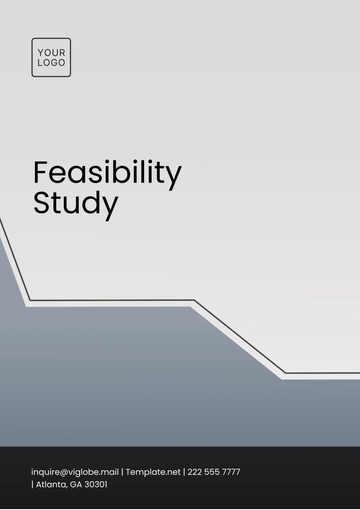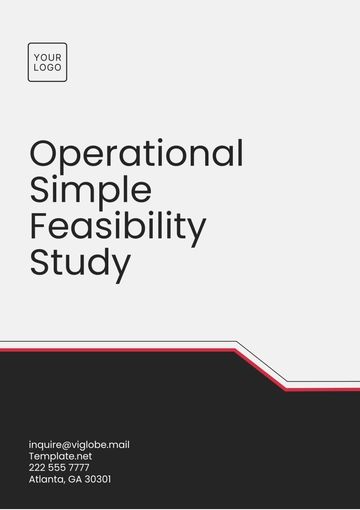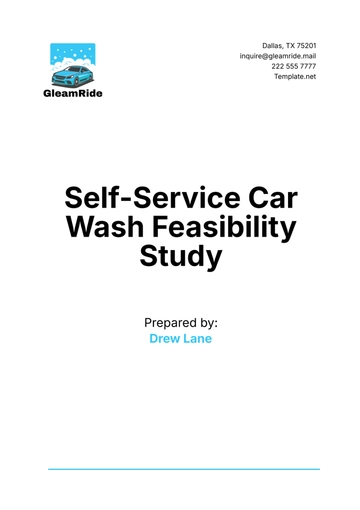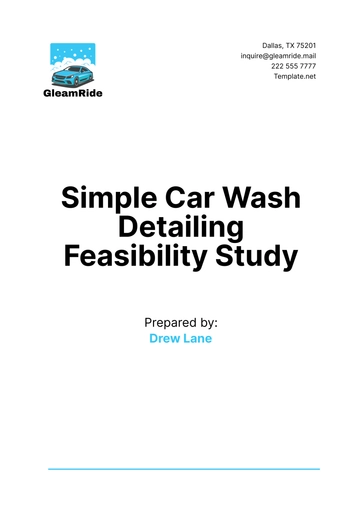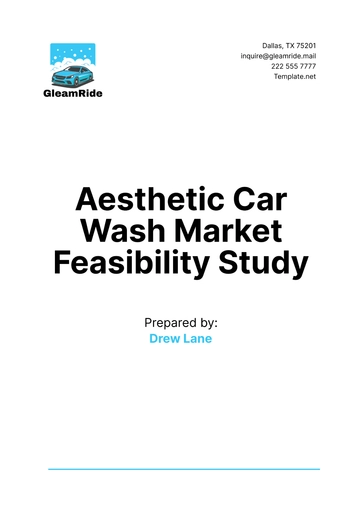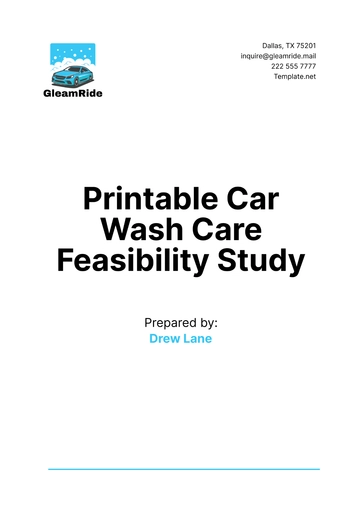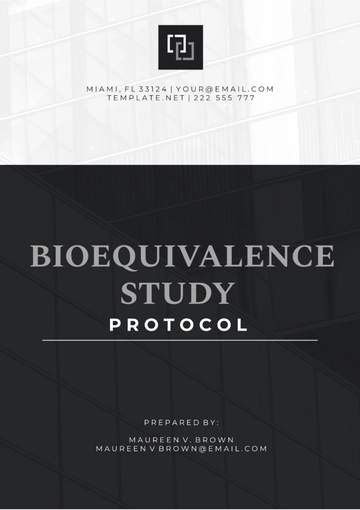Free Simple Car Wash Detailing Feasibility Study
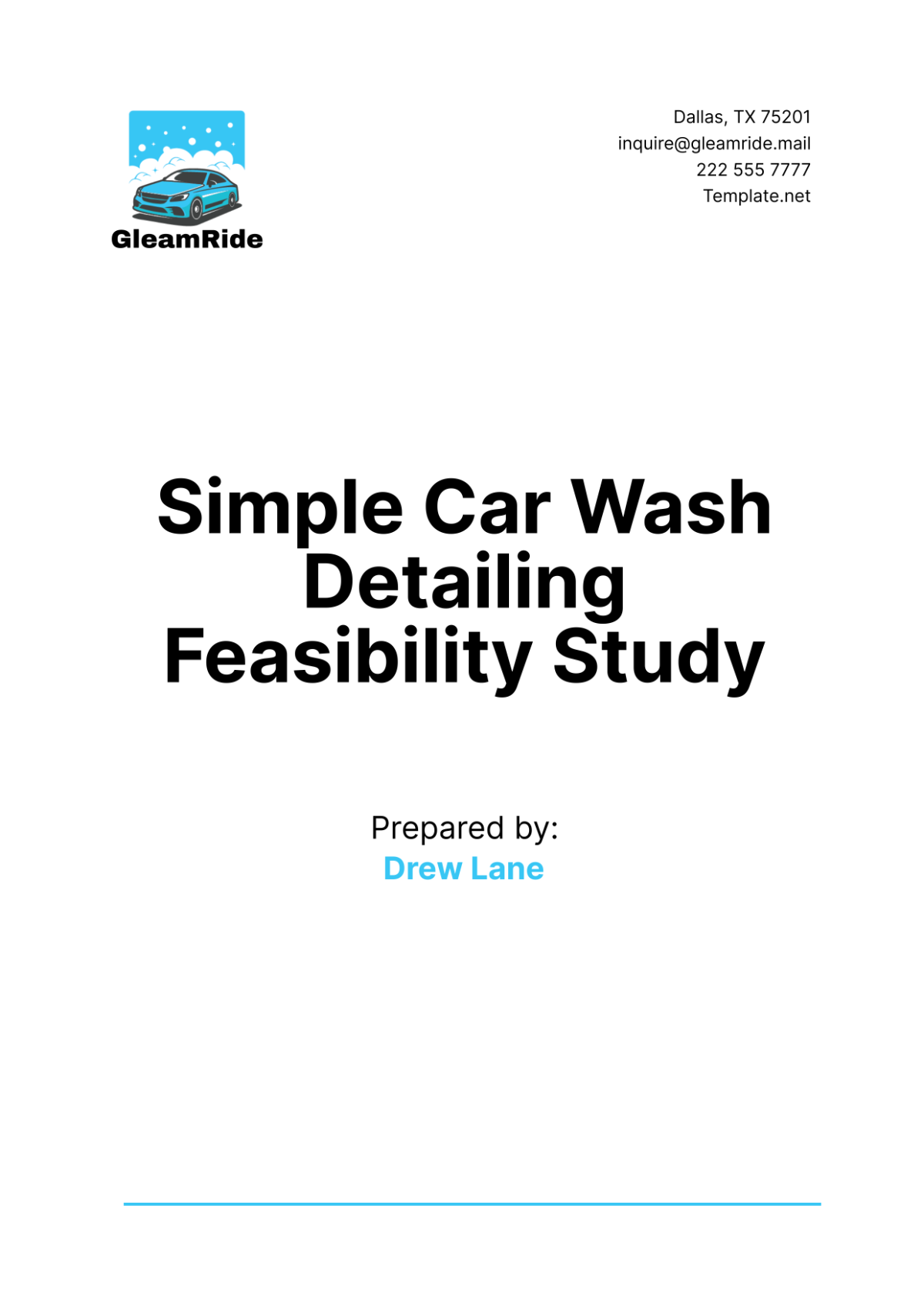
I. Introduction
A. Overview
In response to the increasing demand for automotive care services in urban areas, [Your Company Name] proposes to establish a Simple Car Wash Detailing Service in [City]. This feasibility study aims to comprehensively assess the viability of such a venture by examining market dynamics, financial feasibility, operational logistics, regulatory requirements, and strategic considerations for sustainable growth.
B. Objectives
Market Demand Analysis: Evaluate the current and projected demand for car wash and detailing services in [City]. This includes understanding consumer preferences, behaviors, and spending patterns related to vehicle maintenance.
Competitive Landscape: Assess the competitive environment by identifying key competitors, analyzing their strengths and weaknesses, and evaluating their market share and service offerings.
Financial Feasibility: Determine the initial investment required to launch the business, forecast revenue streams based on pricing strategies and market projections, and analyze potential profitability over a defined timeframe.
Operational Considerations: Outline the necessary infrastructure, equipment needs, staffing requirements, and operational processes to ensure efficient service delivery and customer satisfaction.
Strategic Growth: Identify opportunities for expansion and diversification within the local market, leveraging competitive advantages and market insights to achieve sustainable growth and market leadership.
C. Scope
This study will focus on:
Market Analysis: Conducting a thorough examination of the local car wash and detailing industry, including growth trends, customer demographics, and competitive positioning.
Financial Projections: Developing detailed financial forecasts, including revenue projections, cost analysis, and profitability assessments to guide investment decisions.
Operational Logistics: Planning for facility setup, equipment acquisition, staffing plans, and service protocols to meet operational objectives and maintain service quality.
Regulatory Compliance: Understanding and complying with regulatory requirements, including permits, licenses, and environmental regulations necessary for conducting business in [City].
Strategic Considerations: Formulating strategies for sustainable growth and market expansion, including customer acquisition tactics, brand positioning, and operational efficiencies to enhance competitive advantage.
II. Market Analysis
A. Industry Overview
The car wash and detailing industry in [City] serves a diverse customer base ranging from individual vehicle owners to fleet operators. This sector has witnessed steady growth due to increasing urbanization, rising disposable incomes, and a growing awareness of the importance of vehicle maintenance among consumers.
B. Market Demand
Consumer Behavior: Recent surveys indicate that approximately 89% of vehicle owners in [City] prefer professional car wash services over self-service options. This preference is driven by the convenience, time savings, and superior cleaning results offered by professional car wash facilities.
Market Size: The total annual expenditure on car wash services in [City] is estimated at $13 million, with an anticipated annual growth rate of 25%. This growth is fueled by an expanding vehicle fleet and increasing demand for specialized detailing services.
C. Competitive Analysis
Key Competitors: Major competitors in the local market include established brands such as [Competitor 1], [Competitor 2], and [Competitor 3]. These companies offer a range of services from basic exterior washes to premium detailing packages, catering to various customer preferences and budgets.
Competitive Advantage: [Your Company Name] plans to differentiate itself by offering exceptional customer service, utilizing eco-friendly cleaning products, and providing convenient mobile service options. By focusing on sustainability and customer satisfaction, [Your Company Name] aims to attract environmentally conscious consumers and capture a niche market segment.
III. Financial Projections
A. Revenue Forecast
Service Pricing Strategy: [Your Company Name] will adopt a competitive pricing strategy, with basic car wash packages priced between $15-$25, and premium detailing packages ranging from $75-$150. Pricing will be structured to appeal to both cost-conscious consumers seeking value and high-end customers looking for superior service quality.
Projected Sales: Initial monthly sales are projected to reach $30,000, with an expected increase to $50,000 per month by the end of the first year. These projections account for seasonal fluctuations, promotional campaigns, and the ramp-up period required to establish brand recognition and attract a loyal customer base.
B. Cost Analysis
Startup Costs: [Your Company Name] anticipates initial startup costs totaling $200,000. This includes $100,000 for equipment purchases, $50,000 for leasehold improvements, and $50,000 for working capital to cover operational expenses during the first three months of operation.
Operating Expenses: Monthly operational costs are estimated at $42,000 and include payroll expenses for 10 full-time and 5 part-time employees ($25,000), cost of cleaning supplies and consumables ($5,000), utility bills ($3,000), marketing and advertising expenditures ($7,000), and maintenance costs ($2,000). These expenses are essential for maintaining service quality and ensuring smooth business operations.
C. Profitability Assessment
Break-even Analysis: Based on the projected revenue and cost structure, [Your Company Name] expects to reach the break-even point within 9 months of operation. Monthly revenues are forecasted to cover fixed and variable costs by month 10, indicating a sound financial strategy and sustainable business model.
Profit Margin: [Your Company Name] targets a gross profit margin of 60% on service sales, driven by efficient cost management and economies of scale as customer volumes increase. Net profitability is anticipated within the first two years, reflecting the company’s ability to generate sustainable returns on investment.
IV. Operational Plan
A. Location and Facilities
Site Selection Criteria: [Your Company Name] will secure a 2,500 square feet facility located in a high-traffic area with easy accessibility and ample parking. The chosen location is strategically positioned to attract both residential and commercial vehicle owners, maximizing customer reach and service utilization.
Facility Design and Layout: The facility design will feature three service bays equipped with state-of-the-art car wash equipment, a dedicated customer waiting area with seating for 15 customers, an administrative office for business operations, and storage space for cleaning supplies and equipment maintenance.
B. Equipment and Technology
Automated Systems: Installation of advanced car wash equipment including automated wash tunnels, water recycling systems, and eco-friendly cleaning solutions. This technology enhances operational efficiency, reduces water consumption, and minimizes environmental impact, aligning with [Your Company Name]’s commitment to sustainability.
Software Integration: Implementation of a comprehensive customer management system to facilitate online booking, appointment scheduling, and payment processing. This software integration streamlines service delivery, reduces wait times, and enhances overall customer satisfaction and retention.
C. Staffing and Training
Workforce Composition: [Your Company Name] plans to hire 10 full-time and 5 part-time employees with expertise in vehicle detailing techniques, customer service, and safety protocols. Staffing levels will be adjusted based on seasonal demand fluctuations and operational requirements, ensuring optimal service delivery and customer satisfaction.
Training and Development Programs: Continuous training initiatives will be implemented to enhance employee skills, knowledge, and professionalism. Training sessions will focus on service standards, product knowledge, safety procedures, and customer interaction, fostering a culture of excellence and continuous improvement within the workforce.
V. Regulatory Considerations
A. Permits and Licenses
Regulatory Compliance: [Your Company Name] will adhere to local zoning regulations, environmental standards for water usage and waste management, and health department guidelines for sanitation and hygiene. Obtaining necessary business licenses, permits, and insurance coverage for liability and worker’s compensation is crucial to ensuring legal compliance and operational integrity.
Compliance Monitoring: Regular inspections and audits will be conducted to monitor adherence to regulatory requirements and proactively address any compliance issues. [Your Company Name] is committed to upholding high standards of environmental stewardship and operational excellence, ensuring responsible business practices and community engagement.
VI. Marketing Strategy
A. Brand Positioning
Brand Identity: [Your Company Name] will establish a distinctive brand identity centered around reliability, quality, and environmental responsibility. The brand will convey professionalism and trustworthiness, appealing to both individual consumers and commercial clients seeking premium car care services.
Unique Selling Proposition (USP): Emphasize [Your Company Name]’s commitment to using eco-friendly products, delivering exceptional customer service, and offering convenient service options such as mobile detailing. This USP differentiates [Your Company Name] from competitors and resonates with environmentally conscious consumers.
B. Promotional Campaigns
Launch Strategy: Prior to the grand opening, [Your Company Name] will launch a targeted marketing campaign across multiple channels, including social media, local print advertisements, and partnerships with nearby businesses. This campaign will build anticipation, generate buzz, and attract an initial customer base.
Customer Loyalty Programs: Implement loyalty programs and referral incentives to encourage repeat business and word-of-mouth referrals. Offer discounts on bundled services, seasonal promotions, and exclusive benefits for frequent customers to enhance customer retention and maximize lifetime value.
C. Online Presence
Website Development: Develop a user-friendly website featuring service descriptions, pricing information, online booking capabilities, customer testimonials, and contact details. The website will serve as a digital storefront, enabling customers to conveniently schedule appointments and learn more about [Your Company Name]’s services.
Search Engine Optimization (SEO): Optimize the website content with relevant keywords, meta tags, and local SEO strategies to improve online visibility and attract organic traffic. Regularly update the website with fresh content, blog posts, and promotional offers to engage visitors and enhance search engine rankings.
VII. Risk Management
A. Risk Assessment
Operational Risks: Identify potential risks such as equipment malfunctions, supply chain disruptions, and staffing shortages that could impact service delivery and customer satisfaction. Develop contingency plans and emergency protocols to mitigate these risks and maintain business continuity.
Financial Risks: Assess risks related to fluctuating operating costs, economic downturns, and competitive pricing pressures. Maintain adequate cash reserves, explore financing options, and implement cost-saving measures to safeguard profitability and financial stability.
B. Legal and Regulatory Risks
Compliance Risks: Stay updated on evolving regulatory requirements and industry standards to minimize legal liabilities and ensure ongoing compliance. Engage legal counsel to review contracts, lease agreements, and insurance policies to protect [Your Company Name]’s interests and mitigate potential legal risks.
Environmental Risks: Address environmental risks associated with water usage, chemical disposal, and ecological impact. Implement sustainable practices, invest in eco-friendly technologies, and collaborate with environmental agencies to uphold responsible business practices and preserve natural resources.
C. Reputation Risks
Customer Satisfaction: Prioritize customer feedback, reviews, and complaints management to maintain high service standards and positive brand perception. Implement quality assurance programs, conduct regular customer surveys, and resolve issues promptly to enhance customer satisfaction and loyalty.
Public Relations: Monitor online reputation through social media monitoring tools and proactive communication strategies. Respond to customer inquiries, address negative feedback diplomatically, and highlight positive customer experiences to build trust and credibility within the community and industry.
VIII. Conclusion
A. Summary of Findings
Based on the comprehensive analysis presented in this feasibility study, [Your Company Name]’s proposed Simple Car Wash Detailing Service is deemed highly feasible and potentially profitable within the competitive market of [City]. The strategic combination of competitive pricing, superior service quality, eco-conscious operations, and customer-centric approach positions [Your Company Name] for success in capturing and retaining market share.
B. Recommendations
Implementation Strategy: Secure financing for startup costs and initial operational expenses, prioritizing investments in equipment, facility enhancements, and marketing initiatives to build brand awareness and attract customers.
Market Penetration: Develop a robust marketing and promotional strategy focused on highlighting [Your Company Name]’s unique value proposition, emphasizing convenience, service excellence, and environmental sustainability to appeal to target demographics.
Operational Excellence: Continuously monitor and optimize operational processes to enhance efficiency, reduce costs, and maintain service quality standards. Solicit customer feedback and conduct regular market assessments to identify opportunities for service improvement and future expansion initiatives.
- 100% Customizable, free editor
- Access 1 Million+ Templates, photo’s & graphics
- Download or share as a template
- Click and replace photos, graphics, text, backgrounds
- Resize, crop, AI write & more
- Access advanced editor
Evaluate detailing services with the Simple Car Wash Detailing Feasibility Study Template from Template.net. It's customizable and editable, designed for viability assessment. Utilize our Ai Editor Tool to analyze market demand and costs, ensuring informed decisions in launching car wash detailing services.



